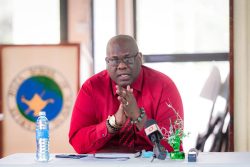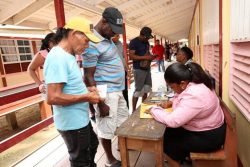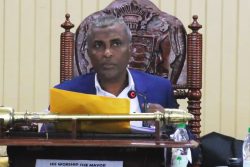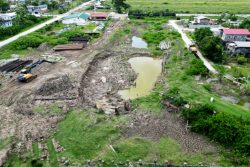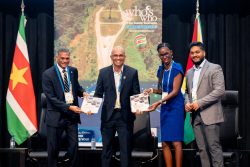Beryl provides more reason for the region to hear from the food security ‘Lead Heads’
If in the light of recent events the Stabroek Business has decided to take yet another tilt at the issue of regional food security that is because we could not think of another more suitable issue to address in the wake of the intrusion of Hurricane Beryl and the further negative impact that it has had on food security in some territories even before she had made her rumbustious presence felt. There can be no question about the ill-timed nature of Beryl’s barge in though it has to be said that the tropical episodes of one level of intensity or another are no stranger to the region and that it is the intensity rather than the inevitability of the phenomenon that is at issue here.
Beryl came and left and in terms of the footprint that it left, our worst fears were realized and there are even those who would say that the extent of the mopping up operation that is still in progress leaves us in no doubt, first, that Beryl came at us stomping and storming and that it may well have provided an indication of the likely much more rampaging impact of its successors.
If we had already known, from time immemorial that, to an overwhelming extent, humans remain near powerless in the face of the forces of nature, there is an extent to which mitigation options are at our disposal. Two things immediately come to mind. The first is the need to make well-thought-out modifications to our architecture (mind you these are mitigation tools rather than altogether remedial ones) designed to spare us the furthest apocalyptic consequences insofar as destruction of property is concerned. Here, this will require the application of multi-disciplinary minds in areas that include architecture. Beyond that other skills and professions will have to be pressed into service in an effort to find ways of maximizing the protection of our food resources, both crops and livestock. We can go further, revisiting the design of our Airports and Airstrips (and marine vessels) to ensure that we are not altogether unable to move people and cargo from one location to the next.
Both the frequency and the intensity of natural disasters in the region and the high price that we customarily pay for our vulnerability, ought to have, by now, sent a message to our regional mechanism, the Caribbean Community (CARICOM) that rather than become overwhelmed by the reality of what we describe as the forces of nature we can go as far as we humanly can in putting serious mitigation measures in place, however modest these might be. Here it has to be said that while initiatives that include providing food supplies to the affected territories, post facto, are usually effected, there is need for much deeper thinking on the part of CARICOM, in collaboration with the specialized UN and other agencies to spare us the worst excesses of episodes like Beryl.
It is, of course, not true to say that the seriously affected are altogether ignored in their hour of need. The truth of the matter is that the regional responses often appear somewhat scrambled and, perhaps, if it is possible to put some of the mitigating measures into place well ahead of the episodes, then who knows the extent to which we might limit the disaster? By sheer coincidence the need for the movement of significant volumes of food into the hurricane-affected parts of the region coincided with an interlude during which (try as this newspaper did) it could not secure a ‘peep’ out of CARICOM and more specifically out of President Irfaan Ali and Prime Minister Mia Mottley regarding the situation in the matter of the creation of a ‘regional food terminal’ an assignment handed to them by their CARICOM colleagues.
While there may well have been circumstances that had unavoidably stalled the delivery of the Food Terminal, the lack of response from the designated ‘Lead Heads’ ought not to be set aside without some action that points to a sense of accountability on the part of the ‘Lead Heads’ themselves. At some point in time, and sooner rather than later, the region should hear from President Ali and Prime Minister Mottley on what is a circumstance that ought not to have been allowed to occur.

